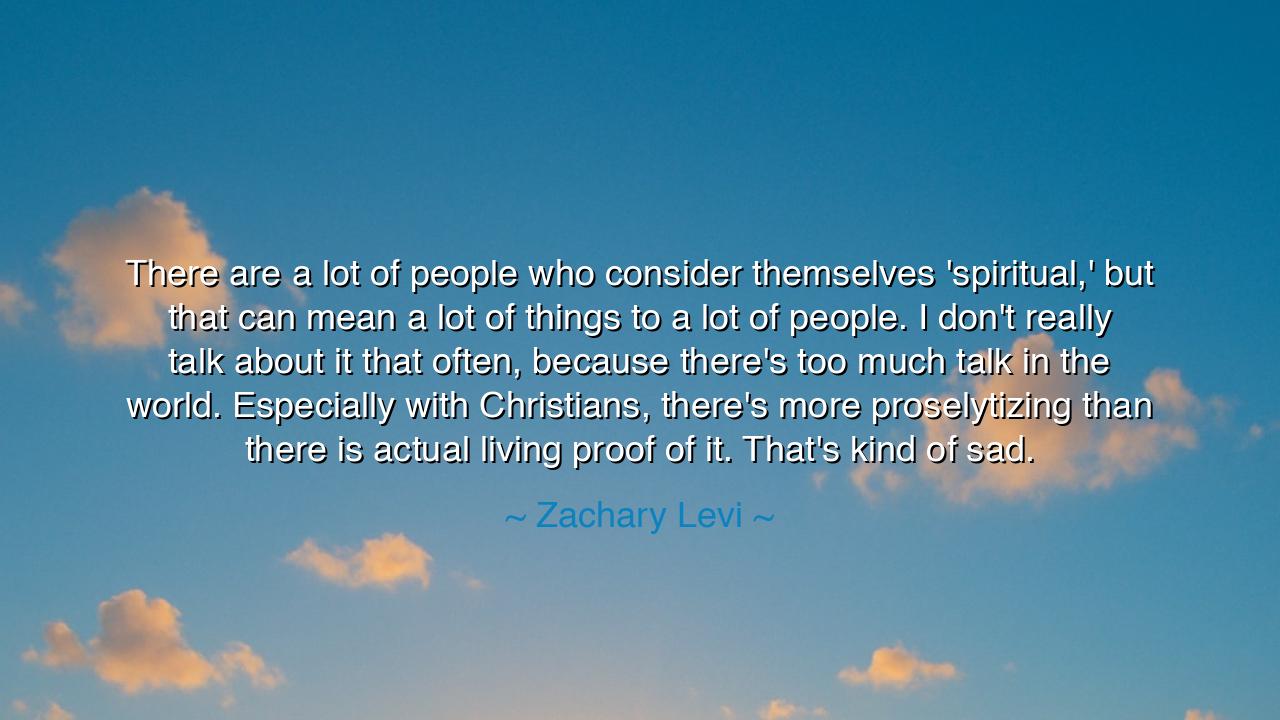
There are a lot of people who consider themselves 'spiritual,'
There are a lot of people who consider themselves 'spiritual,' but that can mean a lot of things to a lot of people. I don't really talk about it that often, because there's too much talk in the world. Especially with Christians, there's more proselytizing than there is actual living proof of it. That's kind of sad.






Zachary Levi once spoke with quiet sorrow and deep discernment when he said: “There are a lot of people who consider themselves ‘spiritual,’ but that can mean a lot of things to a lot of people. I don’t really talk about it that often, because there’s too much talk in the world. Especially with Christians, there’s more proselytizing than there is actual living proof of it. That’s kind of sad.” In these words, Levi does not attack belief—he mourns its dilution. He speaks of a world where the sacred has become noisy, where words about faith rise louder than the silent work of compassion. His tone is not that of judgment, but of yearning—for a return to the simplicity of truth lived, not preached.
In ancient times, the wise knew this very tension. The Stoics, those lovers of virtue, warned against the vanity of philosophers who spoke of justice but did not practice it. Epictetus taught, “Don’t explain your philosophy. Embody it.” Levi’s lament is a modern echo of that same wisdom. To speak endlessly of goodness, while failing to act upon it, is to turn faith into theater. The spiritual person, he suggests, should not be known by eloquent words, but by quiet deeds. For what value has the sermon if it does not find its echo in the life of the one who speaks it?
Levi also points to a truth often forgotten: that faith, whether Christian or otherwise, was never meant to be shouted—it was meant to be lived. The great teachers of the past understood this. Buddha’s silence under the Bodhi tree spoke louder than any sermon. Christ Himself spent more time healing the sick and feeding the poor than He did debating theology. The saints of every tradition lived not by argument, but by example. Their lives were the proof of their belief—their humility, their courage, their kindness. Levi calls us back to this ancient way: to let our spirituality be a lamp that shines quietly, rather than a trumpet that demands attention.
His sadness at “too much talk in the world” speaks to the age of endless opinion. In our time, the word “spiritual” has become elastic—shaped by convenience rather than conviction. Many declare it, few embody it. Social media has made prophets of the loud and witnesses of none. Levi’s insight cuts through the noise: true spirituality is not about identity, but integrity. It is the alignment of the soul’s words with its actions. When he says “that’s kind of sad,” he is mourning a society where belief has become performance—where the light of faith flickers beneath the shadow of self-display.
History offers us vivid examples of this contrast between proclamation and practice. During the fall of Byzantium, when the empire was collapsing under siege, the theologians of Constantinople were still debating the exact nature of angelic beings—arguing, while their city burned. Such irony lives on in every age: we discuss righteousness while neglecting to live it. Levi’s sorrow is not new; it is the sorrow of every wise soul who watches humanity trade devotion for discussion, reverence for rhetoric. The lesson is eternal—faith that is not embodied becomes empty.
And yet, beneath his lament, there is hope. Levi’s words remind us that the remedy lies not in abandoning belief, but in returning to authenticity. The call is not to silence spirituality, but to refine it—to strip away vanity and let love be its expression. To “be the proof” of what one believes is to live in truth, to make the invisible visible through kindness, patience, and courage. Such people need not speak of their faith, for their presence itself becomes testimony. The ancient masters called this “right action”—the art of living so sincerely that one’s life becomes prayer.
So let this teaching be preserved for all who seek to walk the path of integrity: speak less of virtue and live it more. Let your faith be seen in how you treat the unseen, how you forgive, how you listen, how you give. The world does not need louder preachers; it needs brighter souls. The divine does not dwell in the noise of argument, but in the silence of service. As Zachary Levi reminds us, spirituality without embodiment is but an echo—but when belief takes form in action, it becomes light, steady and unbreakable, shining quietly upon all who pass near.






AAdministratorAdministrator
Welcome, honored guests. Please leave a comment, we will respond soon